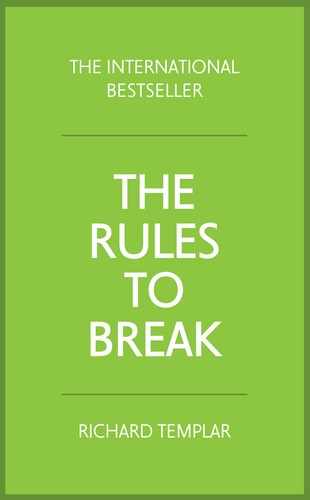Introduction
When you’re young you’re told all sorts of things: I want doesn’t get, the best things in life are free, familiarity breeds contempt, patience is a virtue. And others personal to your own family or teachers. Some of them are drilled into you, some of them you just pick up along the way. As you get older, you pick up even more sayings, principles and beliefs, many of which you just assume to be true and never think to question. So by the time you arrive into adulthood, you’re living by a mixed bag of so-called ‘rules’, whether you know it or not. You might only know it when you suddenly find yourself spouting one of them to a struggling friend or youngster and then think ‘Where on earth did that come from?’
Trouble is, these principles, given as ‘advice’ from well-meaning people, often aren’t true. And many of them are right some of the time, but whoever told them to you failed to explain that there will be times when you should disregard them, or even take the opposite approach.
The point is, you have to learn to question, to think for yourself, not to follow mindlessly the rules set down for you by other people. Otherwise you’ll be making yourself miserable for no reason. Learn to trust your own judgement (now there’s a proverb you can follow all the time).
I’m not saying everything you’re taught is wrong, whether it’s a popular homily or a value impressed on you by your family. I’d entirely agree, for example, that it’s always a good idea to look before you leap. But I agree with it after having thought it through. However, I also think, for example, that it can sometimes be a very good idea to change horses in midstream. And I disagree that attack is the best form of defence, although once in a while it may be the only one that works. And money is certainly not the root of all evil. We can’t pass the blame on to those poor, inanimate notes and coins.
These pretender rules may not all be popular sayings, however. Some of them are beliefs that are incredibly widespread among people. They may be worded in any one of a dozen different ways, but boiled down they all mean the same thing, and the underlying common theme is seriously unhelpful.
Since writing The Rules of Life and my other Rules books (which outline the behaviours of people who get the most out of life and find it easiest and most fulfilling), I’ve discovered that people really do love rules. And that’s part of the problem. Many of us love rules to the point that we just don’t think to question them. I’ve had a lot of emails from readers who have discovered that they are living by rules that are actually what I’d call ‘imposters’ – well-meant advice or beliefs they have just picked up along the way. And that’s why I set out to write this book. To shine a light on the unhelpful beliefs and behaviours that so many of us are carrying around and give them a good poke to see if they really do pass muster.
Think. That’s the message. Question everything you’ve been taught, and don’t live by other people’s rules* until you’ve considered whether you agree with them. Whether you’re 18 or 80, examine the childhood strictures you were told to follow blindly, and decide for yourself whether they’re right. Just regularly catch yourself and ask ‘Why do I believe that?’ and ‘Is it helpful?’
I’m not giving you permission to ignore any rules and values you don’t happen to like. (I wouldn’t do that – you don’t need my permission for anything.) That’s not the way to happiness or success. Be honest with yourself, and sometimes you’ll find yourself reluctantly agreeing with principles you wish you didn’t. Just don’t get tied down unthinkingly to other people’s values. When you become an adult you’re allowed to develop your own set of principles.
So here are the so-called rules that I encourage you to break, at least some of the time. These are the ones I’ve found to be surprisingly common among people from all walks of life. At the end of each entry, I offer you a more reliable ‘replacement’ or proper Rule to put in its place. I hope you find them useful, and do let me know how you get on. You can contact me via my Facebook page, www.facebook.com/richardtemplar. I can’t promise always to find time to respond, but I can promise you that I’ll read your post with interest, and I’d love to know about any rules you’ve successfully broken.
Richard Templar
* Yep, even mine.
